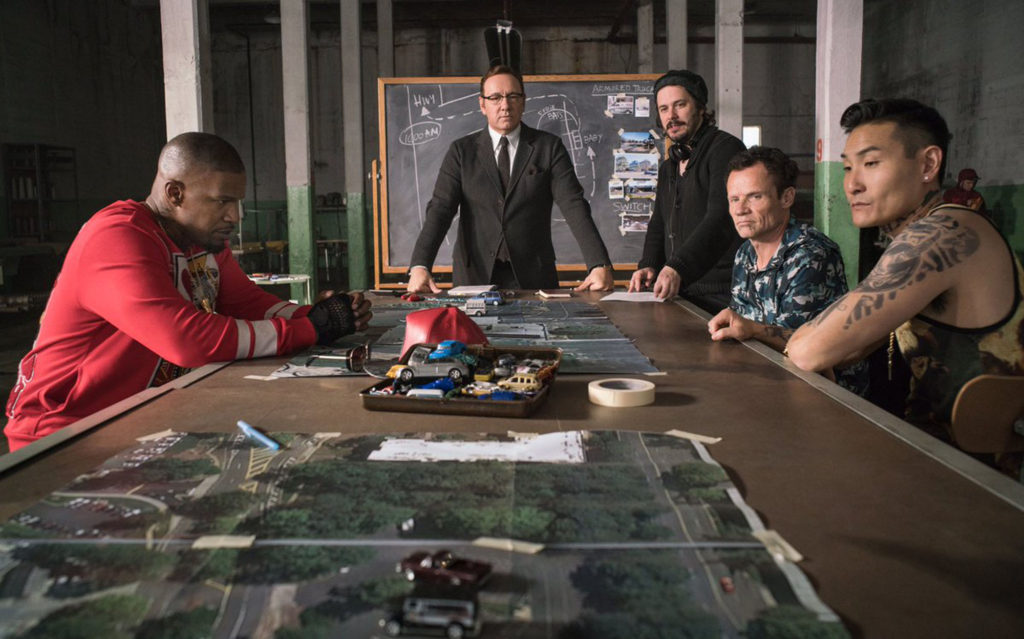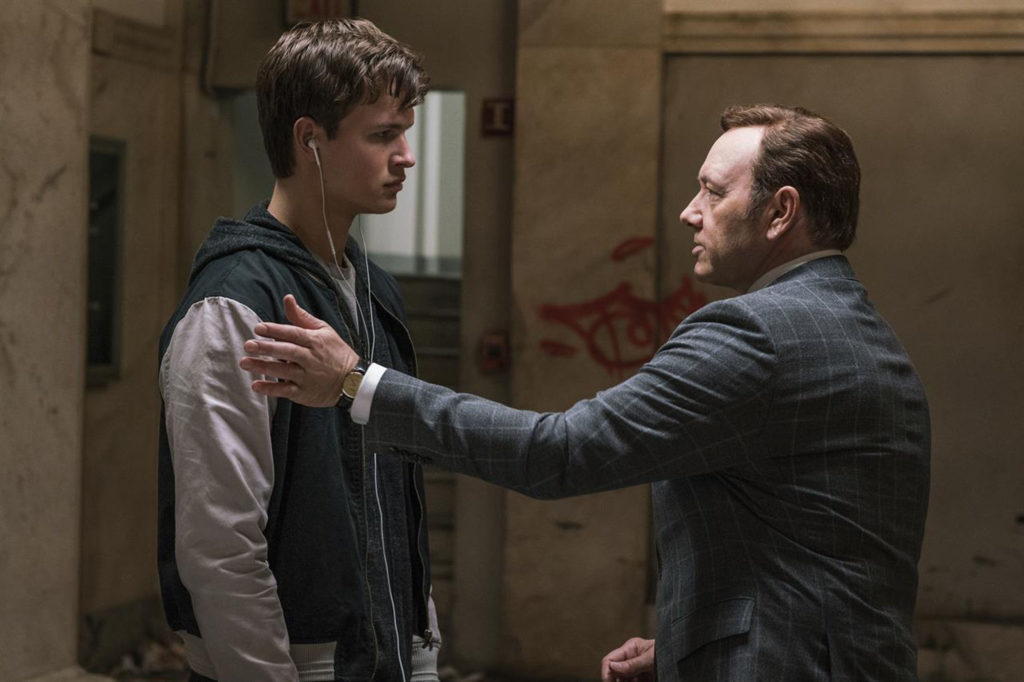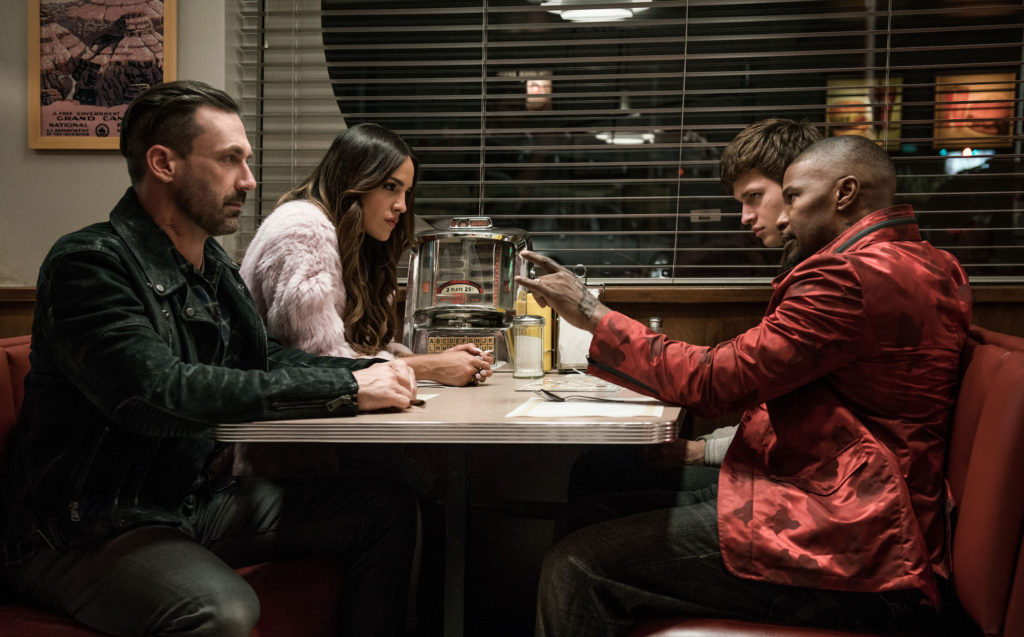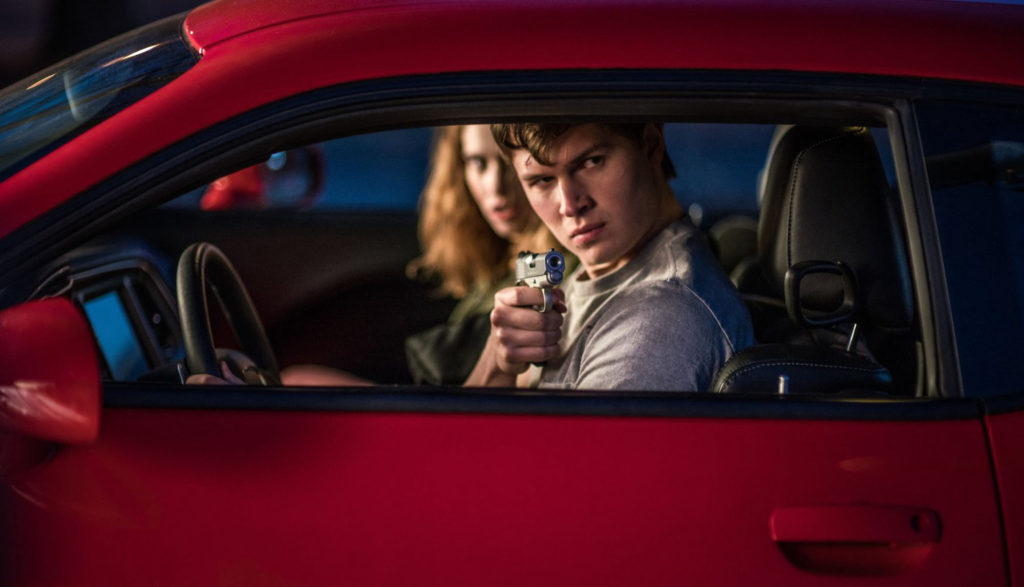Contained here are my thoughts on the 2017 Edgar Wright film Baby Driver, starring Ansel Elgort, Lily James, Jamie Foxx, Kevin Spacey, Eiza González, and Jon Hamm. Some minor plot spoilers ahead but it’s a heist movie, nothing ever goes according to plan…
I hate to overhype things, but Baby Driver is both one of the coolest films to come out in a long while and my favorite movie of this disappointing summer at the movies. The music, actors, action, and costuming all drip with this stylishness that days later makes me want to drift back over to the theater for another ride.
The premise of the film is pretty simple: Baby (Ansel Elgort) is a getaway driver who is obligated to run jobs due to a past transgression against the criminal mastermind Doc (Kevin Spacey).
We first meet Baby as he drives for three experienced bank robbers–Griff (Jon Bernthal), and the love birds, Darling (Eiza González) and Buddy (Jon Hamm).
Shortly after this job, Buddy meets and instantly finds himself head over heels for a diner waitress named Debora (Lily James) who he hopes to run away with once his debts are paid.
Unfortunately for Baby, the real journey begins once he starts his “final” job and meets the over the top, possibly insane, and clearly dangerous, Bats (Jamie Foxx).
Mozart in a Go-Kart
Right out of the gate we are shown where this film really shines. The music and editing are basically perfect, with actions (doors opening, gun shots, steps, punches, etc.) syncing up perfectly with the beats of the music.
The first job and car chase feel so perfectly timed and choreographed that I wished I could rewind it as I sat in the theater, poring over every single cut, sweep, and pan.
People familiar with Edgar Wright might already know that music is integral to his style of storytelling and filmmaking. Take one of my favorite scenes from Shaun of the Dead:
The way actions hit on the beats is one of the things that I always loved about watching this film and you can see versions of this technique used in Wright’s other films. Scott Pilgrim VS The World is another great example (to be fair music is actually used as a weapon in many of the fight scenes in that film).
Cutting on the beat is a staple of video editing, something that we work with our students on in my office, but Wright takes it to another level. What we have in his films, which I feel he basically perfects in Baby Driver, is choreographing and editing the entire film to the beat.
It’s a masterclass in editing, action choreography, sound design, and, most importantly in this situation, music selection.
Towards the beginning of Baby Driver, we learn that our protagonist suffers from tinnitus, a constant “ring” or “hum” in his ears, because of a traumatic incident in his childhood.
Music became his coping mechanism, and throughout the film, Baby is shown to use music to drown out that hum to focus on whatever he is tasked with doing.
Interestingly enough, when the music drops out of the film, you are left with a similar ringing, longing for the music to come back and save you from a lesser version of the torment our Baby faces.
The music is a character in each scene, helping you through how what you are watching will play out, giving you clues to how the scene will ramp up or down–especially if you know the song used in a specific scene.
Every choice in the soundtrack department is perfect, adding the appropriate weight and extra punch to the scenes.
One of my favorite moments in the film, used in some of the trailers, involves a remix of the song “Tequila” and some fantastically timed gun play.
It really is a spectacle to both watch and listen to, a visual and audial treat that we don’t often get in films.
Is He Slow?
(This section may contain a minor plot related spoiler. Just wanted to warn you in case you want to stay completely clean, but as I said up top, it’s a heist movie, you kind of know how the plot in these work…)
After watching the film, I found myself praising the film despite some pacing issues.
I think it’s an issue that we see with a number of action movies that start out with a bang. You want the hits to keep coming, you want the beat to ratchet up.
But the beat can’t always build, you need that brief moment of quiet before the beat drops.

In a film like this, however, that moment can feel like an eternity. It might have actually only been 15 minutes, but that was 15 minutes without action!
After Baby finishes his first two jobs, both featuring some pretty spectacular chase sequences, he finds himself out, he can do whatever he wants.
We watch him spend time with Debora and with his foster father Joseph, as well as get a real job.
Obviously, these moments provide fantastic character development, giving us more insight into the type of person that Baby is.
The problem is that we are still waiting for the beat to drop and it takes a while to get the song going and the crowd back into it.
It’s an issue that can only happen when you are teased with such well executed, high-octane action-filmmaking. As an audience, we find ourselves hungry for more of those delicious car chases even though our waiter, Edgar Wright, is telling us to pace ourselves, take a quick break, and make some room for more.
As an audience, we find ourselves hungry for more of those delicious car chases even though our waiter, Edgar Wright, is telling us to take a moment and make some room.

I’m really interested to see if other folks pick up on this section of the film and if different audience members have different reactions to it.
It is in no way a poor section of the film, still featuring great music, as well as fantastic edits and framing, however, depending on what you are there to see, it can take you out of the action for a little bit too long.
The Moment You Catch Feelings
(Might be a character related spoiler or two here, but nothing that will ruin the film or where it goes for you.)
Though I loved many of the portrayals, I do think some of the characters were a little thin.
Let me ruin this right up front: if you love Shane/The Punisher, Jon Bernthal’s Griff is not in that much of the movie and makes a pretty hasty exit very early on. He even leaves us with the line telling us if we don’t hear from him, he’s probably dead.
Darling is similarly light, serving mostly as a supplement to Buddy’s character. It’s sad because she could have been really interesting if she were more than just a prop.
Buddy and Bats are probably my two standouts in this movie. The intensity crackling between the two characters and their outlook on criminal life is such an interesting and caustic clash of ideals that it serves as the spark to light the firecracker that is the third act of the film.

Kevin Spacey’s Doc is a pretty standard caricature crime boss, melodramatic in the right ways without being annoying. He does have some great lines and I was happy to see them get remixed and used in the film in a pretty fun way.
I did wish for a little more from Debora as well. One of the big problems directors seem to have with writing women in films like this is giving them agency. Personally, I felt like she could have used a bit more development just to make her love for Baby and her desire to go with him make more narrative sense.
That said, I loved many of the scenes where Deb started to get Baby to open up and actually speak.
Baby himself is a very quiet character, with jokes being made to whether or not he is actually mute. His character is more built on his actions, how he interacts with people, how he chooses to escape from the world, and the things and people he loves more than anything.
On that note, there is one character that completely surprised me. Early in the film, we learn that Baby lives with his foster father Joseph, a deaf, wheelchair bound, elderly black man, portrayed by CJ Jones, a deaf actor.
The interactions between Joseph and Baby were so heartfelt and loving that it gave this extra dimension to Baby almost instantly.
Both their sign language conversations and the way that Joseph had to touch the speaker to feel the music that Baby was playing were incredibly endearing.
Their exchanges were simply brilliant and provided this really interesting aspect that I would have never guessed was in the films from the trailers.
I always love the different ways filmmakers approach portraying non-traditional families, and I thought that this specific example was very poignant.

I do think that both Debora and Joseph are used to great effect in humanizing Baby and giving voice to his personal thoughts and desires. Without those two characters as aids, Baby would have easily been too dry and uninteresting to keep the wheels on this vehicle.
Overall, Baby Driver is a stylish, fun summer ride that is sure to stick with quite a few people. It once again serves as an example of why Edgar Wright is one of the most fun filmmakers to watch and why we need to allow for artistic freedom to challenge and change the way films are made. Despite a moment of slowdown, and a few light characters, I can already see myself rewatching this film endlessly for years to come.
So what are your thoughts? Did Baby Driver leave a hum in your drum or are you ready to turn the music off?